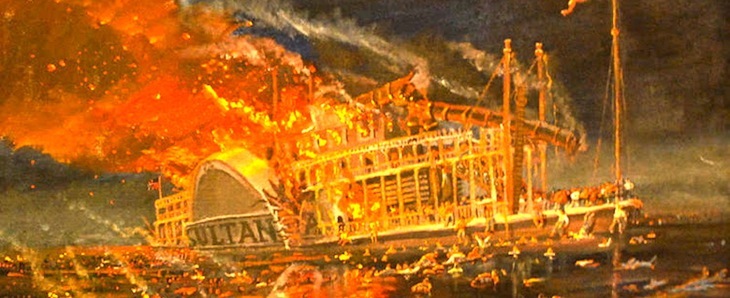Sultana disaster conference set for Saturday
by April 24, 2019 3:25 pm 1,723 views

The worst maritime disaster in U.S. history will be commemorated at a conference in Marion on Saturday (April 27). A myriad of experts will speak during the Sultana Disaster Conference that will be held at the Marion Performing Arts Center, Sultana Disaster Museum Project Director Dr. Louis Intres told Talk Business & Politics.
The Sultana sank on the night of April 27, 1865 near Chicken Island in present day Crittenden County. It carried 2,000 Union soldiers many who had been kept as prisoners of war during the recently finished Civil War. At least 1,200 men died that night, the most to die on any U.S. boat, according to historians.
A nonprofit group, the Sultana Historic Preservation Society, is set to embark on an ambitious plan to build an interactive museum detailing the tragedy in Marion. Museum plans are being formulated and it could cost as little as $4 million or as much as $10 million based on the size of the building, the technology used and the fundraising efforts, Intres previously said.
The conference will feature a morning panel discussion about whether the explosion was the result of sabotage or if it was just a tragedy. That panel will be led by author and historical consultant Gene Salecker, chief engineer for the Hartford Steam Boiler Company.
A presentation of new archived items will be given, and Intres will update progress on the museum. The afternoon session will be headlined by “New York Times” best-selling author Andrew Carroll, who will talk about war letters and little-known historical sites in America.
The Sultana was a paddle-wheel steamboat commissioned in 1863 on the Mississippi River during the Civil War. It had a maximum capacity of 376 passengers. The boat ultimately ended up in Vicksburg, Miss., at the war’s close. The chief quartermaster at Vicksburg, Lt. Reuben Hatch, had a military past filled with corruption. He was from Illinois and had a powerful ally who secured his position at Vicksburg — President Abraham Lincoln.
Hatch was facing a court-martial tribunal for taking bribes during a stint as the quartermaster in Cairo, Ill. His brother O.M. Hatch was a financial backer and personal friend of Lincoln, and before the court-martial took place, the sitting president sent the judge a letter that ultimately led to the dismissal of charges. Hatch then made his way south.
The Sultana arrived in Vicksburg on April 23, 1865, just days after the war had ended and Lincoln had been assassinated. Thousands of Union prisoners of war needed to be transported back to their homes. Many were sick and emaciated. Some were so weak they had to be carried onto the boat, Intres said.
Greed compelled Hatch to place more than 2,000 soldiers on the Sultana instead of dividing the soldiers between it and other available transport boats, said Intres. At Hatch’s behest, those efforts were refused. Loaded six times beyond its capacity wasn’t the only problem the Sultana faced. Her boilers were severely damaged and were in need of repair.
Despite those factors, the boat began the churn north at 9 p.m. in the flood-swollen river headed for Cairo. Three boilers exploded late at night three days later. The hot coals, scalding water and fire killed hundreds in the moments following the initial blast.
Marion residents and other boats along the river attempted to save soldiers who were thrown into the chaotic waters. According to history.net, a sailor aboard the U.S.S. Tyler wrote in the ship’s log: “Of all the sounds and noises I ever heard that was the most sorrowful; some cursing, calling for help; and shrieking. I will never forget those awful sounds.”
For many years, it was believed up to 1,800 soldiers were killed that night, making it a worse tragedy than the sinking of the Titanic in 1912. Recent research indicates the number is closer to 1,200, which means more were still killed on the Sultana than killed on the U.S.S. Arizona during the Dec. 7, 1941 attack on Pearl Harbor.
